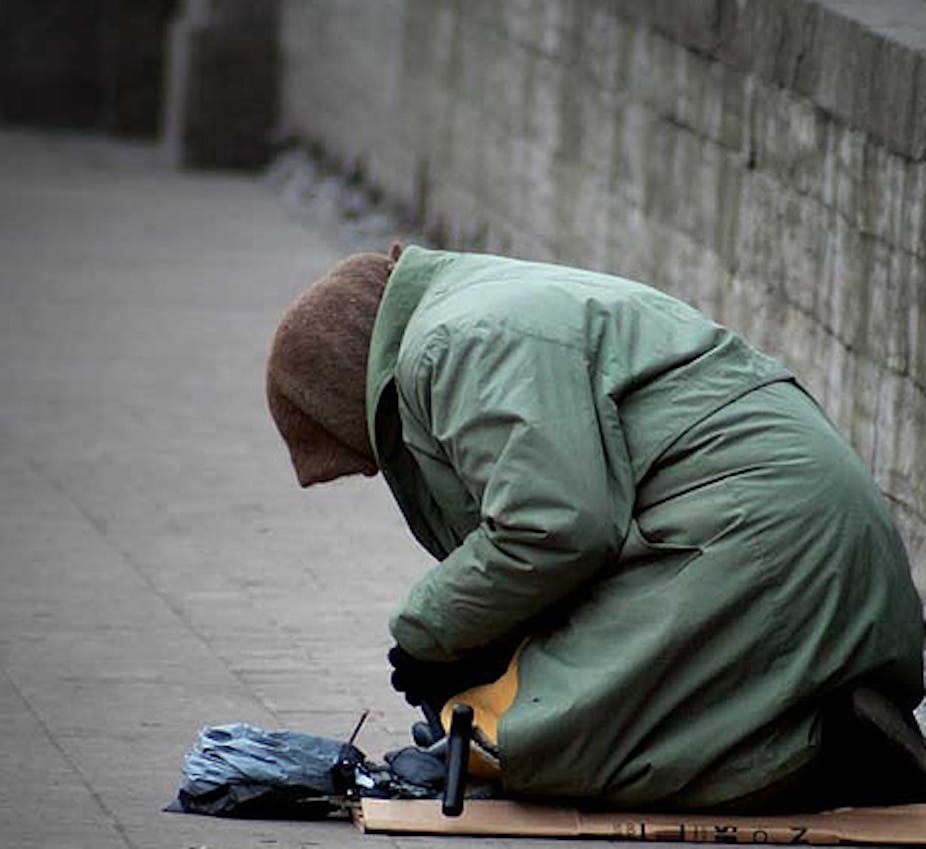The criminal offence of begging should be abolished.
Criminalising begging is tantamount to criminalising poverty. It perpetuates, rather than alleviates, the marginalisation and disadvantage experienced by people who beg. It also violates the fundamental human rights of some of the most vulnerable in our society.
What is poverty?
The Office of the United Nations High Commissioner for Human Rights has adopted a “capability approach” to define poverty which essentially considers the wellbeing of an individual and their ability to “do or be” certain things.
In addition to the concept of “inadequate command over economic resources”, this approach also involves the identification of “certain basic capabilities” that would be common to all.
These include being “adequately nourished, being adequately clothed and sheltered, preventable morbidity, taking part in the life of a community, and being able to appear in public with dignity.”
An understanding of poverty must address health, shelter, public participation, human dignity and income. The criminalisation of begging fails all of these tests.
What is the law?
Begging is a criminal offence in Victoria pursuant to s 49A of the Summary Offences Act and is also prohibited by various local laws made by local councils under the Local Government Act.
Section 49A states that a “person must not beg or gather alms” or “cause, procure or encourage a child to beg or gather alms” with a penalty of up to 12 months imprisonment.
Similar provisions exist in Queensland, South Australia, Tasmania and the Northern Territory.
The PILCH Homeless Persons’ Legal Clinic undertook a survey of people begging in the Melbourne CBD. The survey revealed the reality of the lives of those who beg. It found that 73% were long-term unemployed, more than 50% had a mental illness, 23% had experienced domestic or family violence; and almost 90% were sleeping rough or in squats, or lived in a men’s refuge or rooming house.
Worrying statistics
Victoria Police statistics show that in 2008/09, 242 people were processed by the police for the alleged offence of begging. 24 of these people were arrested, one was cautioned and 212 were issued with summons.
This was an increase from 2007/2008 in which 188 people were processed, with 27 arrested and 153 issued summons. More recent data about outcomes is not yet available, but the total number of persons processed in 2009/10 increased to 298, and then on initial figures, this has reduced to 206 in 2010/11.
Wrong approach
The use of imprisonment, fines and community-based orders as a response to begging fails to deal with the underlying causes of this behaviour. These punishments, contained in the Summary Offences Act, ignore the reality that people who beg are among the most marginalised and isolated in society.
The current approach disproportionately affects those who circumstance have already denied basic necessities such as food, shelter and health care, and then adds to their disadvantage by denying them even the basic right to communicate and seek to deal with their plight.
Begging is usually a last resort activity, engaged in to supplement income and meet subsistence needs. Fining people for such activity exacerbates the causes that underlie it and may encourage people to engage in other illegal income – supplementing activities such as shoplifting, drug dealing and prostitution.
Incarcerating people for such activity also fails to deal with underlying causes and may further jeopardise often tenuous relationships between the individual, his or her family and friends, and society generally.
What we should be doing
A more effective response to begging is to deal with its causes: alleviate the disadvantage of those who beg, and particularly their need for food, shelter and health care.
A more effective response would deal with the underlying causes of begging in a way that respects human rights. We need to increase the availability of quality, secure, crisis, transitional, supported and low cost accommodation and providing income supplements to people who are homeless.
This includes those who are at risk of homelessness who have had social security payments reduced or who are cut off for reasons associated with homelessness.
We should also be increasing the availability and outreach capabilities of quality drug, alcohol and gambling addiction support services.
Law enforcement officers need to be better trained so they understand the issues underlying homelessness and begging and need to be encouraged, where appropriate, to make referrals to welfare agencies and service providers.
We should also consider a centralised referral centre to facilitate the provision of services to people who are homeless or at risk of homelessness.
In modern Australia, we shouldn’t be punishing people who live in poverty; they should be supported, given opportunities and empowered. If a society is judged by how it treats its vulnerable, then the criminalisation of poverty is begging for change.

